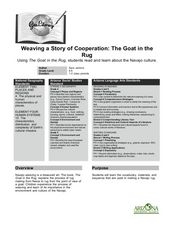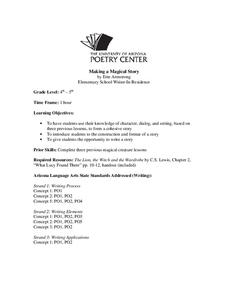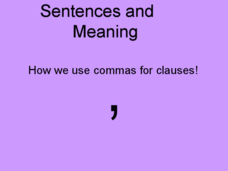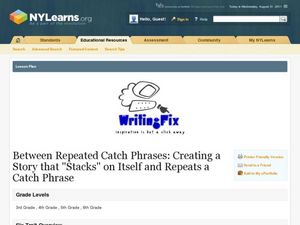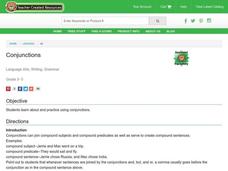Curated OER
Mystery Lessons
Learn about mysteries with your readers. They will investigate plot, basic elements of mystery, famous characters, and become familiar with genre vocabulary. Bring in props and mystery books to begin and then have learners create story...
Curated OER
Reporting from the Front Lines
Students examine the battle of Gettysburg as they write news articles. In this Battle of Gettysburg lesson, students become familiar with the job of the news reporter as they report on the events of the Battle of Gettysburg as they write...
Curated OER
Weaving a Story of Cooperation: The Goat in the Rug
Weaving is an important part of Navajo culture. Read The Goat in the Rug to your fourth and fifth graders, and give them a glimpse into the process of rug making from the point of view of a goat! They will learn new vocabulary words and...
Curated OER
Children's Books
A challenging lesson on writing a book for children awaits your fifth-graders. They must use laptops, document cameras, and a projector to create and present an original piece of writing. A checklist that has all of the requirements for...
Curated OER
Making a Magical Story
Fourth and fifth graders use their knowledge of developing character, dialogue, and setting to produce an original story. An excerpt from The Lion, The Witch, and The Wardrobe is used as inspiration to get everyone's creative juices...
Crafting Freedom
Harriet Jabocs and Elizabeth Keckly: The Material and Emotional Realities of Childhood in Slavery
Through the journals written by Harriet Jacobs and Elizabeth Keckly, young readers gain insight into the lives of two enslaved children on nineteenth-century plantations.
Curated OER
Another Argument at the Dinner Table?
Here is an interesting worksheet on discursive text. Learners read a short essay that expresses two opinions regarding choices of foods to eat by young people. After reading the text, pupils must fill out the worksheet. It has them write...
Curated OER
Where Were Your Ancestors in 1871?
Here is a nicely designed lesson on ancestry and family history. In it, learners read an article entitled, "Where Were Your Ancestors in 1871?" Then, they make up a series of questions to profile their family and their community 100...
Curated OER
Possessive Nouns
Possessive nouns are intricately addressed in this detailed and colorful PowerPoint. Different rules about using possessive nouns correctly are defined with corresponding examples. You can use this presentation prior to assigning...
Curated OER
Troublesome Words: What is a Troublesome Word?
Referring to words that are often used incorrectly, this resource identifies those "troublesome" terms that can produce confusion and shows learners how they should be used properly. Since even adults have trouble using such words as...
Curated OER
Characterization
A 46-slide presentation focuses on ways to describe characters in stories, how to create story characters, and how to show a character's personality in a student-created story. The colorful and engaging slides provide lots of great ideas...
Curated OER
Modern and Classical Poetry
A fabulous presentation of poetry awaits your students. This rich, 14-slide PowerPoint presents many excellent ways for your pupils to compose poems. The presentation encourages them to play with words when composing poems, to analyze...
Curated OER
How we use Commas for Clauses!
Commas can be tricky to use and can also greatly affect sentence meanings. Use this wonderful PowerPoint to remind your class when it is appropriate to use a comma. The last slide includes sentence samples for practice.
Curated OER
Compound Words
Enhance your lesson on compound words with this colorful PowerPoint. This presentation defines a compound word, lists various examples, as well as includes a class activity and assignment. Note: During the reading activity, have students...
Curated OER
Improve Writing
Help your young writers improve their writing skills by showing this great PowerPoint. It includes various tips to improve writing: varying sentence length, beginning with a verb, and lots more! This is a wonderful presentation to show...
Curated OER
Persuasive Writing
Fourth and fifth graders try their hand at persuasive writing. They listen to well-written persuasive articles so they can get a sense of what good persuasive writing is. Then, they brainstorm topics they'd like to write about and are...
EngageNY
Launching Readers Theater Groups: Identifying Passages from Esperanza Rising for Readers Theater that Connect to the UDHR
Teach young readers how to compare two texts and select passages that exemplify a specific theme with Lesson 6 from Unit 3. Begin by modeling how an expert reader selects examples from a text, performing a think aloud on how Article 2 of...
Curated OER
Writing a Topic Sentence
Here is an inventive, and easy-to-implement lesson on the writing of topic sentences. Learners review what a topic sentence is, practice identifying topic sentences in an informational article, then play a really cool game. All of the...
Curated OER
The Amazing Maud Lewis
Students investigate cultural art from Canada by reading about Maud Lewis. In this Canadian history lesson, students identify the work of Lewis by visiting her magazine website. Students identify other heroes in Nova Scotia before...
Curated OER
Creating a Story that "Stacks" on Itself and Repeats a Catch Phrase
Students explore language arts by reading a classic children's story in class. In this story structure lesson, students read the Judith Viorst book, Alexander and the Terrible, Horrible, No Good, Very Bad Day. Students discuss the...
Curated OER
Conjunctions
Students examine the role of conjunctions in the English language. They discuss how conjunctions are used, observe a teacher demonstration, and complete various worksheets related to conjunctions.
Curated OER
Metaphors
Students identify metaphors. In this figurative language lesson, students learn about metaphors and listen to various examples. Students read a story and identify the metaphors present. Students complete a worksheet where they...
Curated OER
Greek Myths
In this language arts worksheet, students discover 9 Greek gods, goddesses and heroes by reading paragraphs about them. Students then complete a crossword puzzle.
Curated OER
How To Interpret a Newspaper Article
In this language arts worksheet, students are asked to interpret a newspaper article. Students will decipher what phrases or catch words are used to capture the reader's attention.
Other popular searches
- English Language Arts Exam
- English Language Arts Games
- Deaf English Language Arts
- English Language Arts Music
- English Language Arts Heroes
- English Language Arts Skills
- Language Arts English
- English Language Arts Grade 3
- English Language Arts Poetry
- English Language Arts Rating=3
- English Language Arts Unit Sc
- Language Arts or English




